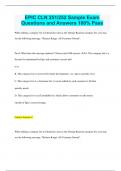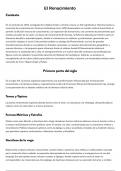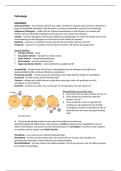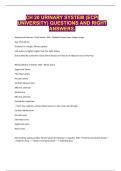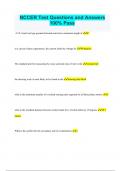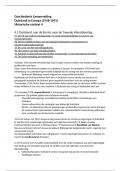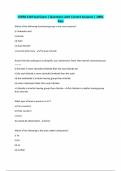Problem 1
Learning Objectives
Which physiological systems are involved in a stress response?
What function does the stress response have? Is this always damaging?
What is startle reflex? How is this affected by fear?
What is ‘psychological’ stress?
What factors influence whether and how you experience stress?
What is coping? What kinds of coping are there?
Are there good effects of stress?
What is stress?
- Two components
o Physical
Involving direct bodily challenge
o Psychological
How individuals perceive circumstances in their lives
- These components can be examined in 3 ways
1. Environment: stress is seen as a stimulus (e.g., demanding job or death in family)
Stressors: physically or psychologically challenging events/circumstances
all stressors produce the same pattern of physiological changes whether
physiological (e.g., temperature exposure) or psychological (e.g., losing job)
2. Stress as a response: people’s reaction towards stressors
Strain: psychological and physiological response to a stressor (e.g., feeling nervous
or heart ponding)
3. Stress as a process: incl. stressors and strains + relationship between the person and
environment
Transactions: continuous interactions and adjustments with person and
environment affecting and being affected by the other
Stress not seen as just stimulus or response, but a process in which person can
influence the impact of a stressor through behavioral, cognitive, and emotional
strategies
- Stress
o Circumstance in which transactions lead a person to perceive a discrepancy between the
physical or psychological demands of a situation and the resources of biological,
psychological, or social systems.
o A demand, resource or discrepancy may be either real or just believed
Chronic psychological stress
- Stress response activates the anterior-pituitary adrenal-cortex system
- Stressors acting on neural circuits stimulate release of adrenocorticotropic hormone (ACTH) from
anterior pituitary, the ACTH in turn triggers release of glucocorticoids from the adrenal cortex and the
glucocorticoids produce many of the components of stress response
o Measure of glucocorticoids most common physiological measure of stress
, - Stressors activate the sympatric nervous system increasing amounts of epinephrine and
norepinephrine released from adrenal medulla
- Stress responses are complex and vary, depending on the stressor, its timing, nature and reaction of
that person
- Stressors produce an increase in blood levels of cytokines, group of peptide hormones released by
many cells, which causes inflammation and fever
- Adrenal hormones and cytokines
o Classified as major stress hormones
- Subordination stress
o
Cognitive appraisal
- Mental process/strategies by which ppl assess 2 factors
1. Primary appraisal: whether a demand threatens their physical or psychological well-being
when encountering potentially stressful circumstance, first try to assess meaning of
situation in terms of well-being
“What does this mean to me?” “Will I be okay or in trouble?”
Circumstances appraised as stressful receive further appraisal for 3 implications
Harm-loss: amount of damage that has already occurred smtms ppl who
experience minor stressor think of it as a “disaster”, exaggerating its
personal impact
Threat: expectation of future harm hospitalized patients contemplating
medical bills
Challenge: opportunity to achieve growth or profit by using more than
routine resources to meet a demand
2. Secondary appraisal: assessment of available resources for coping
E.g., “I can’t do it – I know I’ll fail.”
When we judge our resources as sufficient to meet the demands, we may experience
little or no stress; but when e appraise demands as greater than our resources, we
may feel great deal of stress
- Stressful appraisal depends on two factors
1. Those relating to person
o Incl. intellectual, motivational and personality characteristics
o E.g., ppl with high self-esteem are likely to believe they have resources to meet demands
requiring strengths they possess
o Perfectionism: tendency to appraise minor issues as major problems
2. Those relating to situation
o Events involving strong demands and are imment tend to be seen as stressful
,Posttraumatic stress disorder (PTSD)
- Experiencing severe stressors that creates intense fear and horror can lead to PTSD
- Marked by being highly aroused, reliving events often, and being unresponsive to other people
- Many develop it after being injured in a car accident, or suffering serious medical illnesses
- Those affected more likely to develop various serious illnesses
- Behavior modification therapy with behavioral and cognitive methods can prevent this disorder after a
trauma and help overcome it
Dimensions of stress
- Stronger stressors produce greater psychological strain
- Chronic stress: occurs often or lasts a long time such as when many stressors happen or thoughts
about a trauma recur often over time
o Makes people more susceptible to catching cold when exposed to infection than occasional
stress
Biological aspects of stress
, - Reactivity: physiological portion of the response to a stressor or strain
o Genetic factors influence people’s degree of reactivity to stressors
- Fight-or-flight prepares organism to attack the threat or to flee
o Perception of danger causes sympathetic nervous system to stimulate many organs, such as
the heart, directly, and stimulates the adrenal glands of the endocrine system, which secrete
epinephrine, arousing the body still further
o Fight-or-flight response is adaptive bc it mobilizes the organism to respond quickly to danger,
but high arousal can be harmful to health if it is prolonged
General adaption syndrome (GAS)
1. Alarm reaction
- Like the fight-or-flight response to an emergency, its function is to mobilize body’s resources
- Fast-acting arousal results from sympathetic nervous system, which activates many organs through
direct nerve connections incl. the adrenal glands which when stimulated release epinephrine and
norepinephrine into the bloodstream, producing further activation
- Then, the hypothalamus-pituitary-adrenal axis (HPA) is activated
hypothalamus triggers the pituitary gland to secrete ACTH, which causes adrenal glands to
release cortisol into bloodstream, further enhancing body’s mobilization
2. Stage of resistance
- If strong stressor continues, physiological reaction enters stage of resistance
- Initial reactions of the sympathetic NS become less important, and HPA activation predominates
- Body tries to adapt to the stressor physiological arousal remains higher than normal, and body
replenishes the hormones the adrenal glands released
- Ability to resist new stressors may become impaired, which may make individual vulnerable to health
problems called diseases of adaption (incl. ulcers, high blood pressure, asthma etc.)
3. Stage of exhaustion
- Prolonged physiological arousal produced by long-term stress can weaken the immune system and
deplete the body’s energy reserved until resistance is very limited
- If stress continues, disease and damage to internal organs are likely or death may occur
- GAS is nonspecific with regards to the type of stressor but repeated prolonged stress
Allostatic load
o Effect of body’s having to adapt repeatedly to stressors, such as fluctuations in levels of
hormones like cortisol and epinephrine, blood pressure etc., that accumulate over time
o Impairs body’s ability to adapt to future stressors
- Four factors affecting overall amount of bodily activation or physiological stress
1. Amount of exposure
o Encountering frequent, intense, or prolonged stressors, then more likely to respond with
greater total amount of phys. activation
2. Magnitude of reactivity
o in response to any stressor such as taking a major academic exam, some ppl show large
increase in blood pressure or stress hormones while other show smaller changes
3. Rate of recovery
o Once encounter with stressor is over, physiological responses return to normal quickly for
some people but stay elevated for a longer time for others
o Thinking about stressor after it is over or worrying about it recurring in the future can delay
physiologically recovery
Learning Objectives
Which physiological systems are involved in a stress response?
What function does the stress response have? Is this always damaging?
What is startle reflex? How is this affected by fear?
What is ‘psychological’ stress?
What factors influence whether and how you experience stress?
What is coping? What kinds of coping are there?
Are there good effects of stress?
What is stress?
- Two components
o Physical
Involving direct bodily challenge
o Psychological
How individuals perceive circumstances in their lives
- These components can be examined in 3 ways
1. Environment: stress is seen as a stimulus (e.g., demanding job or death in family)
Stressors: physically or psychologically challenging events/circumstances
all stressors produce the same pattern of physiological changes whether
physiological (e.g., temperature exposure) or psychological (e.g., losing job)
2. Stress as a response: people’s reaction towards stressors
Strain: psychological and physiological response to a stressor (e.g., feeling nervous
or heart ponding)
3. Stress as a process: incl. stressors and strains + relationship between the person and
environment
Transactions: continuous interactions and adjustments with person and
environment affecting and being affected by the other
Stress not seen as just stimulus or response, but a process in which person can
influence the impact of a stressor through behavioral, cognitive, and emotional
strategies
- Stress
o Circumstance in which transactions lead a person to perceive a discrepancy between the
physical or psychological demands of a situation and the resources of biological,
psychological, or social systems.
o A demand, resource or discrepancy may be either real or just believed
Chronic psychological stress
- Stress response activates the anterior-pituitary adrenal-cortex system
- Stressors acting on neural circuits stimulate release of adrenocorticotropic hormone (ACTH) from
anterior pituitary, the ACTH in turn triggers release of glucocorticoids from the adrenal cortex and the
glucocorticoids produce many of the components of stress response
o Measure of glucocorticoids most common physiological measure of stress
, - Stressors activate the sympatric nervous system increasing amounts of epinephrine and
norepinephrine released from adrenal medulla
- Stress responses are complex and vary, depending on the stressor, its timing, nature and reaction of
that person
- Stressors produce an increase in blood levels of cytokines, group of peptide hormones released by
many cells, which causes inflammation and fever
- Adrenal hormones and cytokines
o Classified as major stress hormones
- Subordination stress
o
Cognitive appraisal
- Mental process/strategies by which ppl assess 2 factors
1. Primary appraisal: whether a demand threatens their physical or psychological well-being
when encountering potentially stressful circumstance, first try to assess meaning of
situation in terms of well-being
“What does this mean to me?” “Will I be okay or in trouble?”
Circumstances appraised as stressful receive further appraisal for 3 implications
Harm-loss: amount of damage that has already occurred smtms ppl who
experience minor stressor think of it as a “disaster”, exaggerating its
personal impact
Threat: expectation of future harm hospitalized patients contemplating
medical bills
Challenge: opportunity to achieve growth or profit by using more than
routine resources to meet a demand
2. Secondary appraisal: assessment of available resources for coping
E.g., “I can’t do it – I know I’ll fail.”
When we judge our resources as sufficient to meet the demands, we may experience
little or no stress; but when e appraise demands as greater than our resources, we
may feel great deal of stress
- Stressful appraisal depends on two factors
1. Those relating to person
o Incl. intellectual, motivational and personality characteristics
o E.g., ppl with high self-esteem are likely to believe they have resources to meet demands
requiring strengths they possess
o Perfectionism: tendency to appraise minor issues as major problems
2. Those relating to situation
o Events involving strong demands and are imment tend to be seen as stressful
,Posttraumatic stress disorder (PTSD)
- Experiencing severe stressors that creates intense fear and horror can lead to PTSD
- Marked by being highly aroused, reliving events often, and being unresponsive to other people
- Many develop it after being injured in a car accident, or suffering serious medical illnesses
- Those affected more likely to develop various serious illnesses
- Behavior modification therapy with behavioral and cognitive methods can prevent this disorder after a
trauma and help overcome it
Dimensions of stress
- Stronger stressors produce greater psychological strain
- Chronic stress: occurs often or lasts a long time such as when many stressors happen or thoughts
about a trauma recur often over time
o Makes people more susceptible to catching cold when exposed to infection than occasional
stress
Biological aspects of stress
, - Reactivity: physiological portion of the response to a stressor or strain
o Genetic factors influence people’s degree of reactivity to stressors
- Fight-or-flight prepares organism to attack the threat or to flee
o Perception of danger causes sympathetic nervous system to stimulate many organs, such as
the heart, directly, and stimulates the adrenal glands of the endocrine system, which secrete
epinephrine, arousing the body still further
o Fight-or-flight response is adaptive bc it mobilizes the organism to respond quickly to danger,
but high arousal can be harmful to health if it is prolonged
General adaption syndrome (GAS)
1. Alarm reaction
- Like the fight-or-flight response to an emergency, its function is to mobilize body’s resources
- Fast-acting arousal results from sympathetic nervous system, which activates many organs through
direct nerve connections incl. the adrenal glands which when stimulated release epinephrine and
norepinephrine into the bloodstream, producing further activation
- Then, the hypothalamus-pituitary-adrenal axis (HPA) is activated
hypothalamus triggers the pituitary gland to secrete ACTH, which causes adrenal glands to
release cortisol into bloodstream, further enhancing body’s mobilization
2. Stage of resistance
- If strong stressor continues, physiological reaction enters stage of resistance
- Initial reactions of the sympathetic NS become less important, and HPA activation predominates
- Body tries to adapt to the stressor physiological arousal remains higher than normal, and body
replenishes the hormones the adrenal glands released
- Ability to resist new stressors may become impaired, which may make individual vulnerable to health
problems called diseases of adaption (incl. ulcers, high blood pressure, asthma etc.)
3. Stage of exhaustion
- Prolonged physiological arousal produced by long-term stress can weaken the immune system and
deplete the body’s energy reserved until resistance is very limited
- If stress continues, disease and damage to internal organs are likely or death may occur
- GAS is nonspecific with regards to the type of stressor but repeated prolonged stress
Allostatic load
o Effect of body’s having to adapt repeatedly to stressors, such as fluctuations in levels of
hormones like cortisol and epinephrine, blood pressure etc., that accumulate over time
o Impairs body’s ability to adapt to future stressors
- Four factors affecting overall amount of bodily activation or physiological stress
1. Amount of exposure
o Encountering frequent, intense, or prolonged stressors, then more likely to respond with
greater total amount of phys. activation
2. Magnitude of reactivity
o in response to any stressor such as taking a major academic exam, some ppl show large
increase in blood pressure or stress hormones while other show smaller changes
3. Rate of recovery
o Once encounter with stressor is over, physiological responses return to normal quickly for
some people but stay elevated for a longer time for others
o Thinking about stressor after it is over or worrying about it recurring in the future can delay
physiologically recovery

